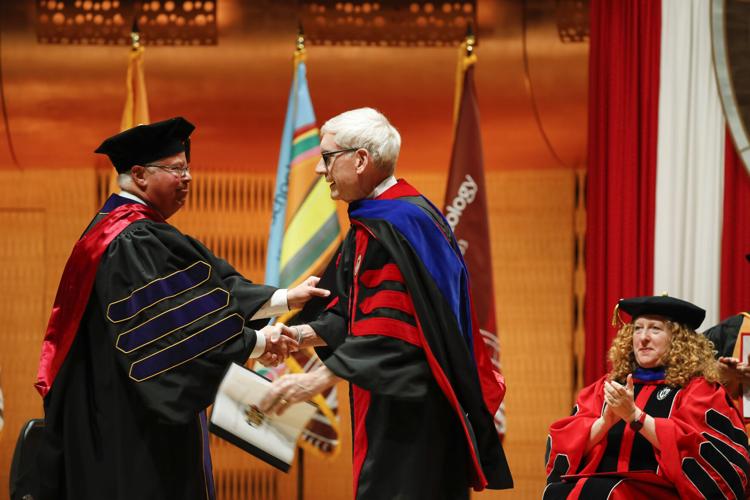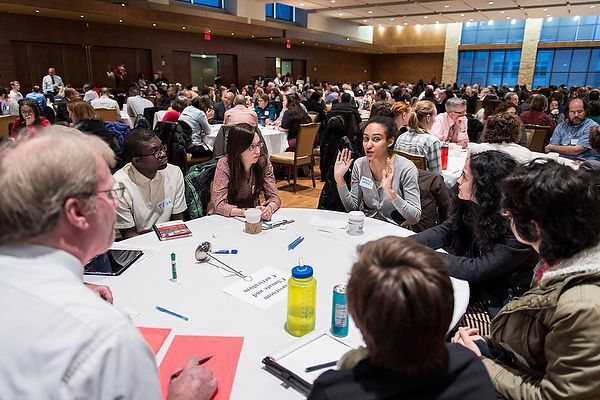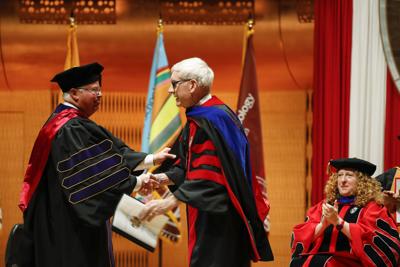A compromise brokered between Universities of Wisconsin officials and one of the state's most influential Republicans is not really a done deal, even after a highly public and controversial vote of the UW Board of Regents.
Each side of the agreement still has to take steps to fulfill various promises they made to each other, a process that is expected to take years and that could face new barriers.
The agreement between Assembly Speaker Robin Vos, R-Rochester, and university officials would freeze the number of UW system positions devoted to diversity, equity and inclusion and repurpose some of the existing staff members for now.
In exchange, the Legislature was expected to approve a series of pay raises for university staff, allocate funding to the UW system for workforce development and sign off on state money for key building projects at several campuses.
Most notably, those projects include building a new engineering facility and renovating a residence hall on the University of Wisconsin-Madison campus, renovating an education building at UW-Whitewater and spending over $45 million to demolish buildings on campuses statewide.
The deal approved Dec. 13 by the regents drew praise but also widespread criticism, as many worry the UW schools will be forced to kill or at least gut programs designed to attract and retain students and staff of color and create a better path to higher education for veterans, people with disabilities and students from low-income families.
Legislators took the first step to keep their end of the bargain on Tuesday, signing off on a 6% pay raise over the next two fiscal years for roughly 35,000 UW system employees. Back pay retroactive to July 1 is expected to show up on workers' paychecks Jan. 11.
A legislative committee was able to pass the raises on its own, as they were part of a $415 million pay plan for all state employees that had already been approved in the budget bill signed into law by Gov. Tony Evers earlier this year.
But other items will require action to be taken by the full Legislature. And while Vos’ imprimatur on the deal signals support in the Assembly for the new building projects, backing in the Senate is not guaranteed.
Senate Majority Leader Devin LeMahieu, R-Oostburg, has supported the deal but was not directly involved in the negotiations.
LeMahieu has also spoken out in favor of a new UW-Madison engineering building and told the Cap Times Tuesday that he believes other Republican senators share his viewpoint.
“I think so,” LeMahieu said when asked if he had the needed support for the building projects. “We haven't talked about it as a caucus.”
Resistance to UW engineering building

Assembly Speaker Robin Vos agreed to move forward with nearly $400 million in funding for a new engineering building for UW-Madison after a deal brokered between top Republicans and university officials.
Senate President Chris Kapenga, R-Delafield, said he hadn’t yet decided on whether he would support the larger package of building projects.
But he raised concerns with the engineering building specifically, arguing its construction did not make financial sense given the number of students who would use it. The $397 million development would allow the addition of over 1,000 engineering undergraduates and 500 graduate students at a time, according to the university.
“The cost per student doesn't make sense to me,” Kapenga said. “I'm not a big fan.”
Kapenga said that although the Republican caucus had yet to see or discuss any formal bill, he believes the building projects would ultimately have enough support to pass.
The new engineering building has drawn support from a cross-section of business and university leaders.
But the item was excluded from the final version of the budget earlier this year, removed by GOP members of the Legislature’s budget writing committee from the $2.4 billion spending blueprint for renovating and constructing new state buildings.
Evers, who included the project in his budget proposal, also sought legislative approval for the funding again in September, when he called a special session to urge the Legislature to take up a series of workforce and childcare projects. Money for the building was ultimately removed again by Republican legislators.
The engineering school has a series of aging buildings, which administrators have argued can be a turn-off for the students and researchers the college needs to recruit to advance its research. That is particularly true at a time when Wisconsin is expected to see a demand for engineers grow.
Unclear timeline for DEI changes

University of Wisconsin-Madison students, faculty and others participate in a 2015 forum called "A Campus Conversation About Diversity and Inclusion."
The universities, meanwhile, have agreed to reclassify at least 43 diversity, equity and inclusion positions as “student success” roles and freeze the hiring of new administrators and DEI employees for three years.
The UW system has yet to announce which specific positions will be restructured or how their responsibilities will change. UW system spokesman Mark Pitsch told the Cap Times "we have two academic years to reorient the positions toward academic and student success."
While that was the most prominent part of the agreement, the universities must also create a freedom of expression module for all incoming students and eliminate any required diversity statements in admissions.
Pitsch said none of the state's campuses currently requires diversity statements on undergraduate applications, “but we would anticipate assessing these and all other application forms.” On when and how the system will implement the freedom of expression lessons for new students, Pitsch replied: "TBD."
In addition, UW-Madison will create an endowed chair position on conservative thought, classical liberalism or classical economic theory. And UW-Madison must end its Target of Opportunity Program, which helps academic departments recruit diverse faculty. The campus is required to instead create a program recruiting faculty — regardless of identity — who have experience mentoring “at risk” or underrepresented students.
The universities also agreed to support a bill to automatically admit high-achieving Wisconsin high schoolers into UW schools, provided they are in the top 10% of their class. Those in the top 5% of their class would gain automatic admission to UW-Madison.
That bill passed the state Assembly on a party-line vote in November after the UW opposed the idea, arguing it would be unwieldy to implement. Proponents believe guaranteed admission is a way of keeping Wisconsin’s brightest students at in-state universities.
The state Senate has yet to take action on the measure, although it will need to be amended to align with the terms of the deal, which also would call for direct admissions for National Merit scholars.
Evers’ office did not respond to a request for comment on whether he would consider signing the admissions bill, should it reach his desk.
Pitsch, in an email to the Cap Times, also pointed to a caveat in all the compromises with Vos: "It is important to note that, as outlined in the agreement, the steps taken by the Universities of Wisconsin are contingent upon action by the state Legislature."









